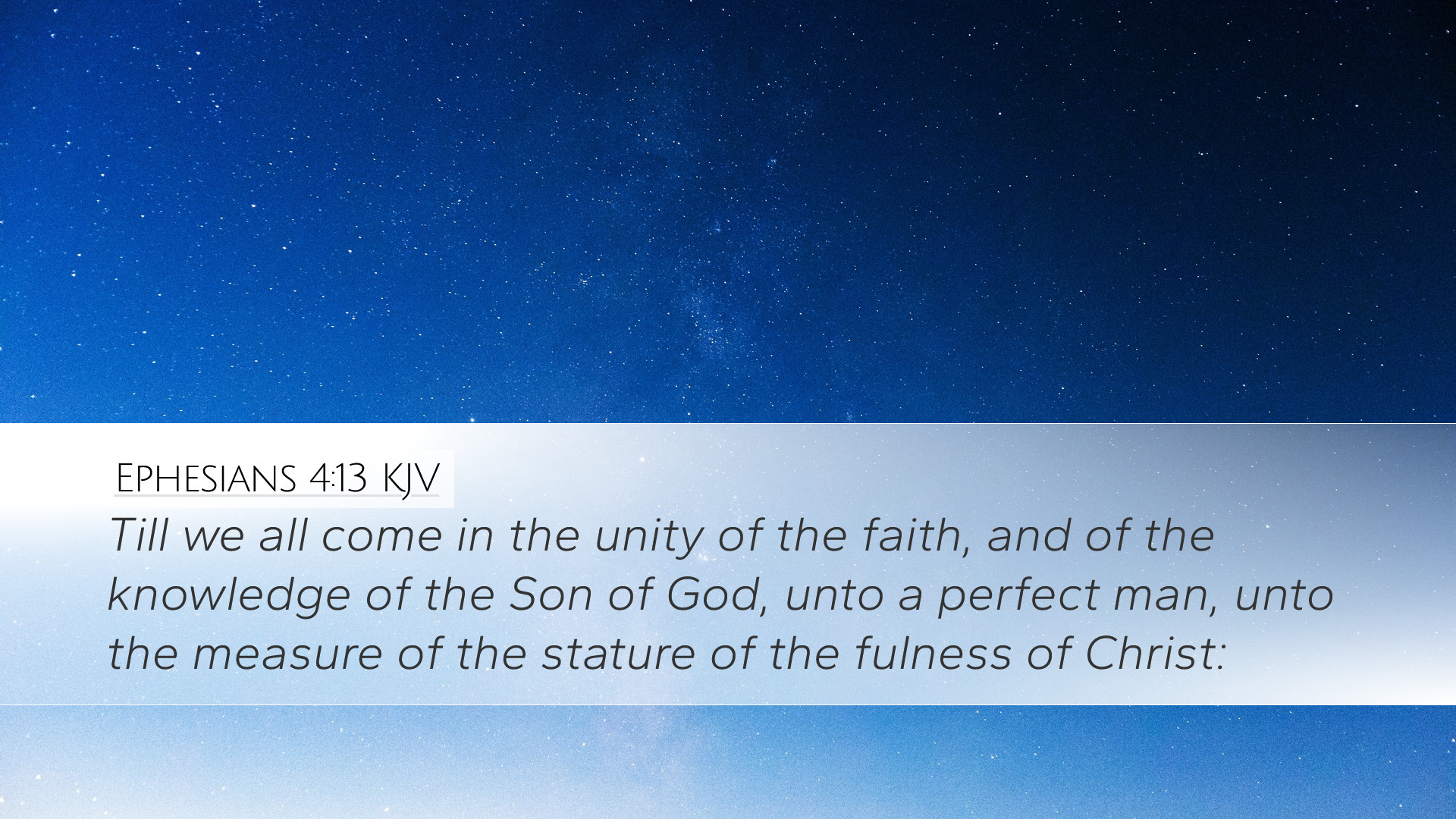Ephesians 4:13 Commentary
Ephesians 4:13 states: "Until we all come to the unity of the faith and of the knowledge of the Son of God, to a perfect man, to the measure of the stature of the fullness of Christ." This verse forms a significant theological pillar in understanding the purpose of the Church and the Christian journey. Below, insights are gathered from prominent public domain commentators to delve deeper into its meaning and implications.
Contextual Overview
The apostle Paul writes Ephesians to address various issues within the Church at Ephesus, emphasizing the unity and maturity of believers. Chapter 4 particularly focuses on the gifts given to the church for the purpose of fostering growth and unity among its members.
Commentary Insights
Matthew Henry’s Commentary
Matthew Henry emphasizes that this verse expresses the ultimate goal of the church's ministerial efforts. He states that "the unity of the faith" refers to a collective agreement among believers on doctrinal truths. Paul envisions a community where all believers grow harmoniously into knowledge and faith, avoiding division and strife.
Henry points out the significance of "the knowledge of the Son of God." He explains that this knowledge is not merely intellectual but involves a genuine relationship and intimacy with Christ. Knowing the Son leads to a deeper understanding of His nature and work, influencing believers' conduct and overall growth.
Albert Barnes’ Notes
Albert Barnes provides profound insights into the term "perfect man." He explains that this does not imply absolute perfection but rather maturity in the faith — a completeness that reflects Christ's character. Barnes elaborates that this maturation process involves both individual and collective growth, stressing the importance of the Church's role in this journey.
Moreover, Barnes notes the phrase "the measure of the stature of the fullness of Christ." This expression conveys the aspiration for believers to reflect the fullness of Christ's virtues and character, suggesting that the Church is to grow not just in numbers but in spiritual depth and likeness to Christ.
Adam Clarke’s Commentary
Adam Clarke draws attention to the "until we all come." He underscores that this is a communal journey rather than an individual endeavor, indicating that the faith community must work together toward this divine goal. Clarke highlights that the unity of faith is established in both doctrine and practice, urging believers to gather around core biblical truths.
Clarke further elaborates on "the fullness of Christ," noting that this fullness implies the embodiment of all divine attributes and graces. He remarks that achieving this measure is a divine objective, calling believers to a transformative process that aligns their lives with Christ's example.
Theological Significance
Understanding Ephesians 4:13 is vital for grasping God's intent for His Church. The call for unity and maturity reflects God's design for a thriving, holistic faith community. Here are some key theological insights regarding this passage:
- Unity in Faith: Ephesians 4:13 emphasizes the importance of doctrinal unity. The church is called to uphold truth and strive for collective understanding.
- Knowledge of Christ: The knowledge referred to is transformative. A deeper relationship with Christ leads to spiritual instruction and enlightenment.
- Maturity in Christ: Growth in Christlikeness involves an ongoing process of sanctification, where believers increasingly reflect Christ's character in their lives.
- Collective Mission: The verse underscores that the journey of faith is communal, where the local church functions as a body to edify and build each other up.
Practical Applications
The implications of Ephesians 4:13 for pastors, students, and theologians are profound. Here are several practical applications of this passage:
- Teaching and Preaching: Pastors should focus on sound doctrine, emphasizing the essentials of faith to cultivate unity within the congregation.
- Discipleship Programs: Implement discipleship initiatives that center on building a deeper knowledge of Christ, fostering personal and communal growth.
- Encouraging Community: Create environments where believers are encouraged to foster relationships, promoting communal responsibility for spiritual growth.
- Reflecting Christ’s Character: Challenge believers to embody the fruits of the Spirit, thereby displaying Christ to the world around them.
Conclusion
Ephesians 4:13 encapsulates a vision of unity, maturity, and collective identity in Christ. By synthesizing the insights of Matthew Henry, Albert Barnes, and Adam Clarke, we uncover a rich theological tapestry that continues to challenge and inspire the Church. As we strive toward the fullness of Christ, let us be diligent in fostering an environment where faith flourishes, and believers are equipped to reflect Christ's love and grace in all aspects of life.


